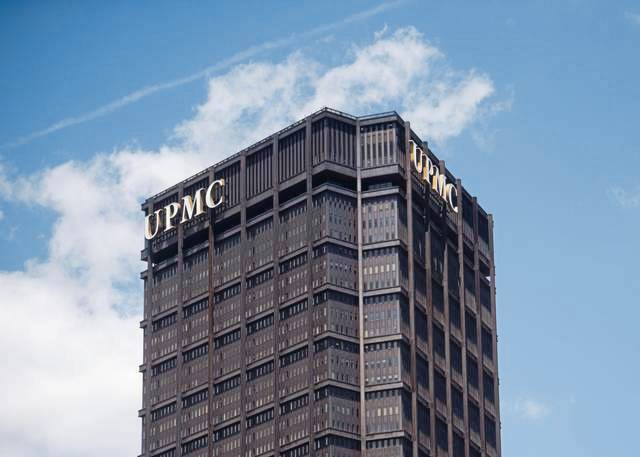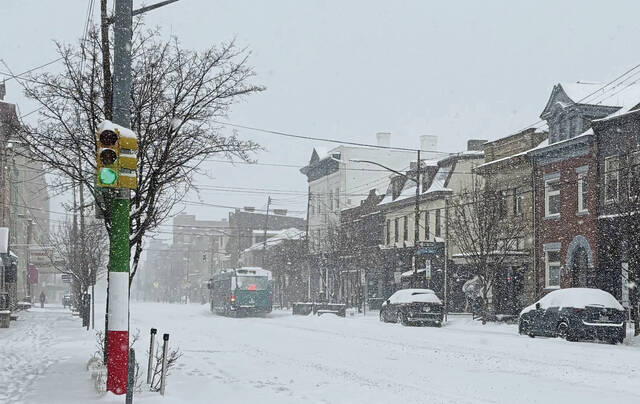UPMC officials on Friday came together to make a concerted push for monoclonal antibody treatment for covid-19, strongly encouraging covid-positive individuals who are most at risk for hospitalization and death to ask for the treatment.
Dr. Erin McCreary, an infectious disease pharmacist, described monoclonal antibodies as “copies of antibodies that seek out the covid virus and block it from infecting your cells and replicating.”
“So essentially, we’re giving your immune system a leg up on the virus, before it can take hold and wreak havoc,” she said.
The treatment first received emergency use authorization from the U.S. Food and Drug Administration in November.
Providers are authorized to give the treatment, through one-time intravenous (IV) infusion, to people older than 65, and people aged 12-64 who have certain chronic health conditions.
Dr. Graham Snyder, medical director of infection prevention and hospital epidemiology, noted this was the same treatment given to former President Donald Trump when he was diagnosed with the virus.
McCreary said the system offers two treatments that use a combination of antibody therapies — which recent data show to be more effective, in light of the emerging variants of the virus. One treatment is from Eli Lilly and Company and the other from Regeneron.
UPMC began administering monoclonal antibody treatment in December, and has given it to more than 1,000 patients. Data has shown that those who received the treatment were 70% less likely to be hospitalized or die from covid-19, the physicians said.
“We think there is a tremendous reservoir of people who are not getting this incredible, transformative breakthrough right now,” said Dr. Don Yealy, UPMC’s senior medical director and chair of emergency medicine.
At this point, Yealy said the system is trying to increase the number of people offered the treatment, partnering with the Allegheny County Health Department and other health systems to “get the word out” about the option.
The antibody treatments are available at 16 “infusion centers” across the system, including every UPMC hospital. McCreary said the system has the capacity to infuse around 300 patients per week. Yealy noted the medication is free, as it is provided by the federal government. UPMC’s health plan waives all other fees for members, and “many other insurers do the exact same thing,” he said.
“I want to emphasize, if you qualify for monoclonal antibody treatment, your location is not a barrier,” McCreary said. “We will help you get access to care.”
Monoclonal antibodies are intended to be administered soon after a person finds they are covid-positive, before symptoms become severe — ideally, within 10 days of a positive test result.
“You don’t have to be really sick to get monoclonal antibody therapies,” Yealy said. “In fact, we want you to get your treatment as early as possible, particularly when your symptoms are milder. Waiting too long simply limits the opportunity for benefit.”
The physicians’ push for the treatment comes as infections rise in the region. Allegheny County on Friday recorded 586 new covid cases, the highest daily total recorded in two months. Snyder said the increasing prevalence of covid variants plays a role in the increase. On Wednesday, Dr. Debra Bogen, Allegheny County’s health director, said there have been at 33 cases of the B117 variant identified in the county.
The virus’ trend of continuous mutation only emphasizes the need for further treatment options like with antibodies, Snyder said.
“Vaccines may be adaptable to changing variants, we must have another layer of protection,” Snyder said.
The system, meanwhile, has administered 297,000 doses of vaccine to date, Snyder said – 166,000 of which were to individuals not affiliated with UPMC. There have been 11,054 doses administered to residents and staff of long-term care facilities.
Snyder said the system has received nearly 460,000 requests for vaccine through its online scheduling tool – and it currently has 81,000 scheduled.
This story was updated March 27, 2021 to clarify the patients who are eligible for the treatment.








